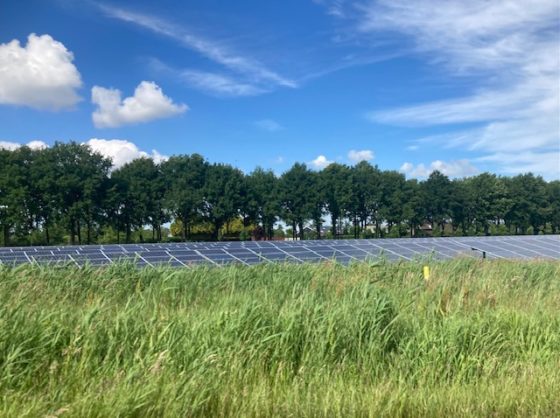Solar farms must look more attractive or local support will melt


New solar farms will have to look more attractive or local protests will put the brakes on the energy transition, researchers from the Wageningen Solar Research Programme have warned.
‘We are already seeing the support for solar farms crumble,’ the programme’s director Sven Stremke told Nieuwsuur.
To reconcile locals to the arrival of solar farms in the countryside, the university and environmental organisations have put together a plan to make them look more attractive and so maintain climate goals.
There is often a discrepancy between the design of a solar farm and what is actually built, Stremke said. Solar farm land is supposed to be used for other purposes as well, such as agriculture, but multi-functional areas can be counted on the fingers of one hand and there is no policy to back this up, Stremke said.
If the farms were to be really multi-functional and combine energy generation with landscape, nature and agriculture, local support would increase, he said.
The economic affairs and climate minstry has said it is working on ‘nature inclusive requirements’ for solar farm licencing from 2024.
Court cases
The number of new solar farms that are the subject of court cases to stop them from being built has doubled since 2019, Nieuwsuur found based on an analysis of published court decisions.
One of the main beefs against solar farm builders is that locals are not consulted, lawyer Emile Euverman said. Apart from location, the lack of greenery to hide the solar panels from view is a frequent grievance, he told the programme.
In Helmond, where the greenery and flower meadow promised in plans for a solar farm were completely absent, locals took owners E-Quest to court.
‘There are no flower beds or high hedges as the initial drawings showed,’ local spokesman Willem Boetzes said. ‘It’s been years now and we hope that they will finally put the greenery in place. That would also improve biodiversity.’
E-quest said in reaction that the lack of greenery was down to a mistake by the local council which had mown the budding growth twice. In addition, the polluted soil is also not conducive to planting, the company said.
A decision in that case is expected at the end of the month.
Thank you for donating to DutchNews.nl.
We could not provide the Dutch News service, and keep it free of charge, without the generous support of our readers. Your donations allow us to report on issues you tell us matter, and provide you with a summary of the most important Dutch news each day.
Make a donation